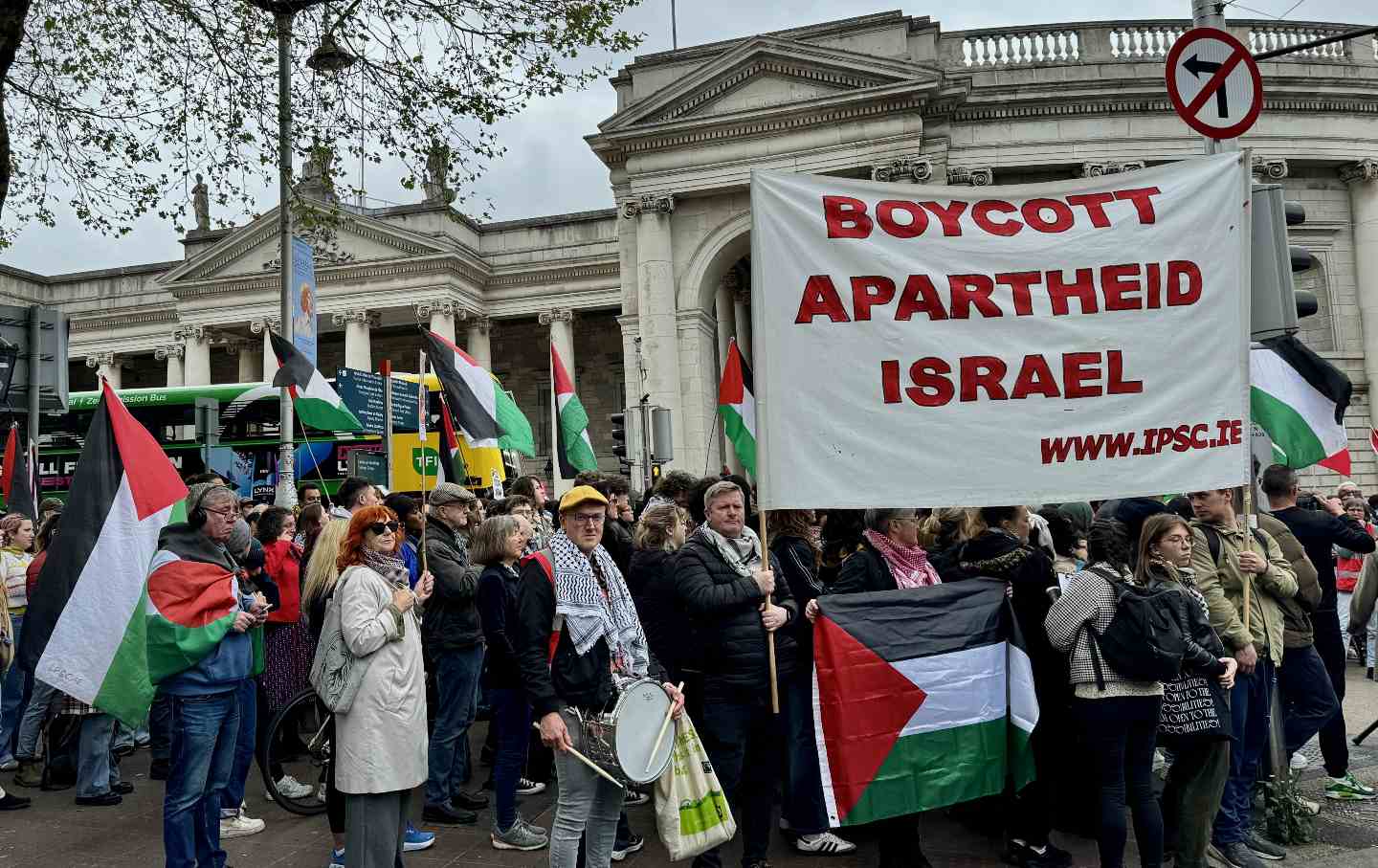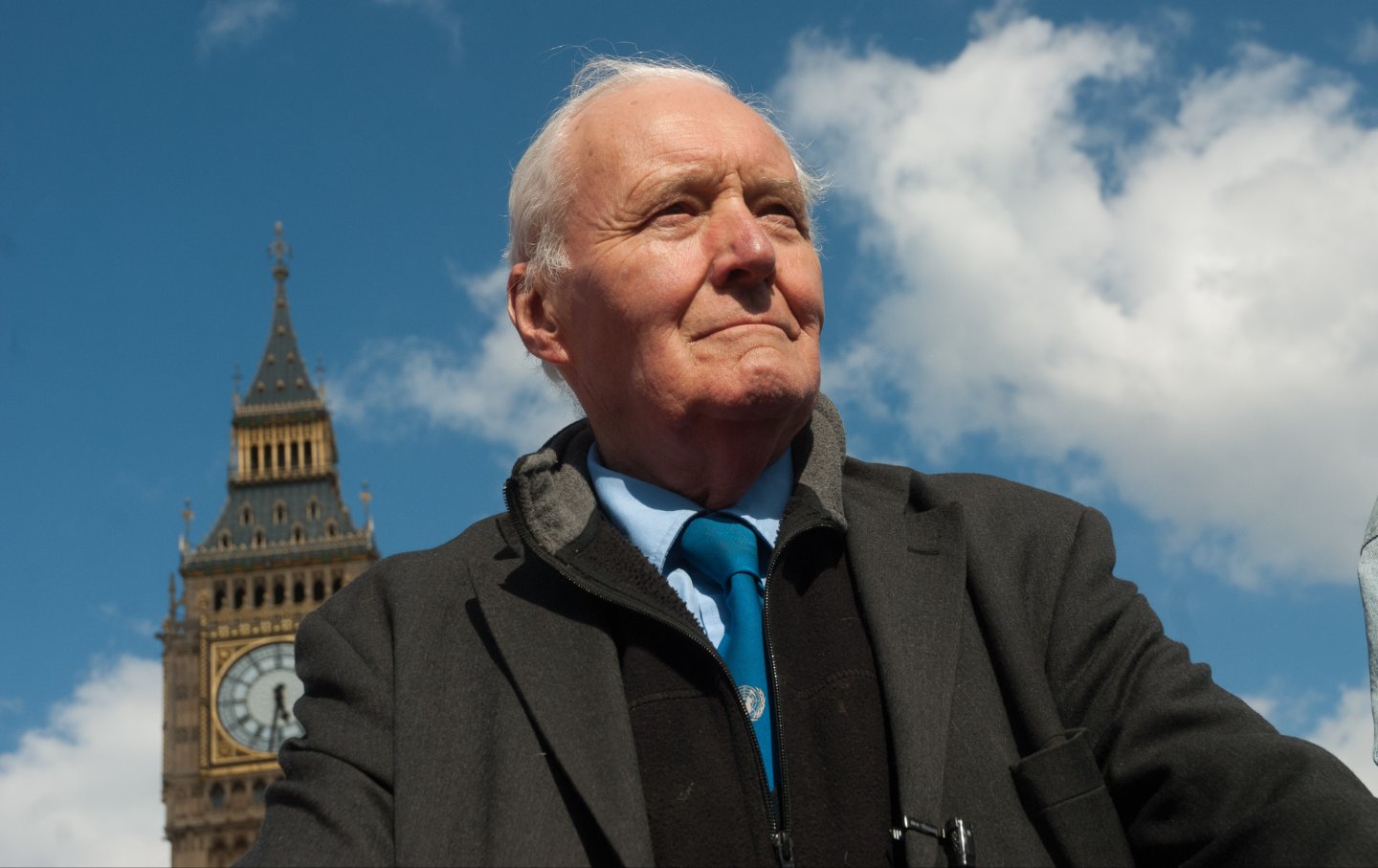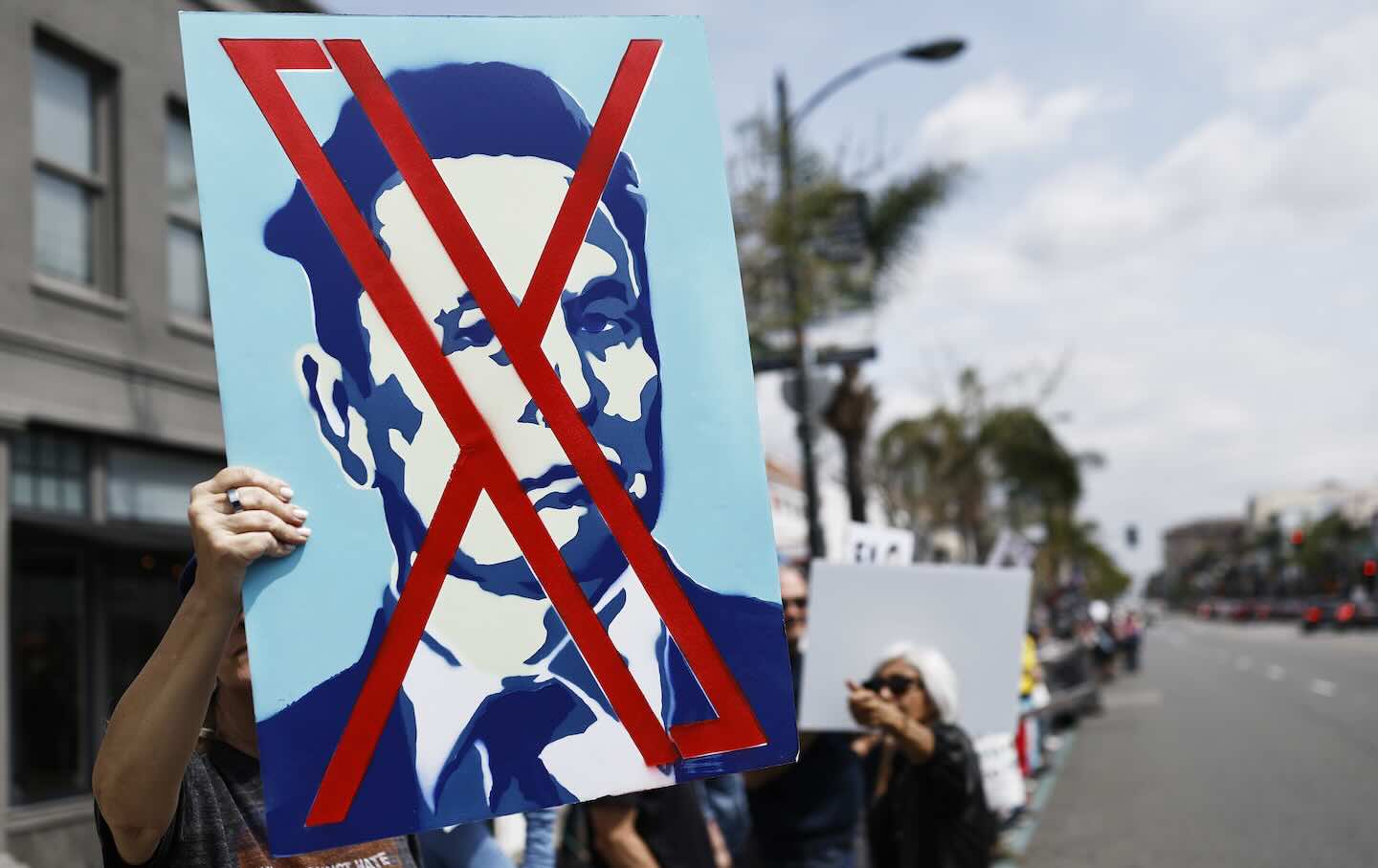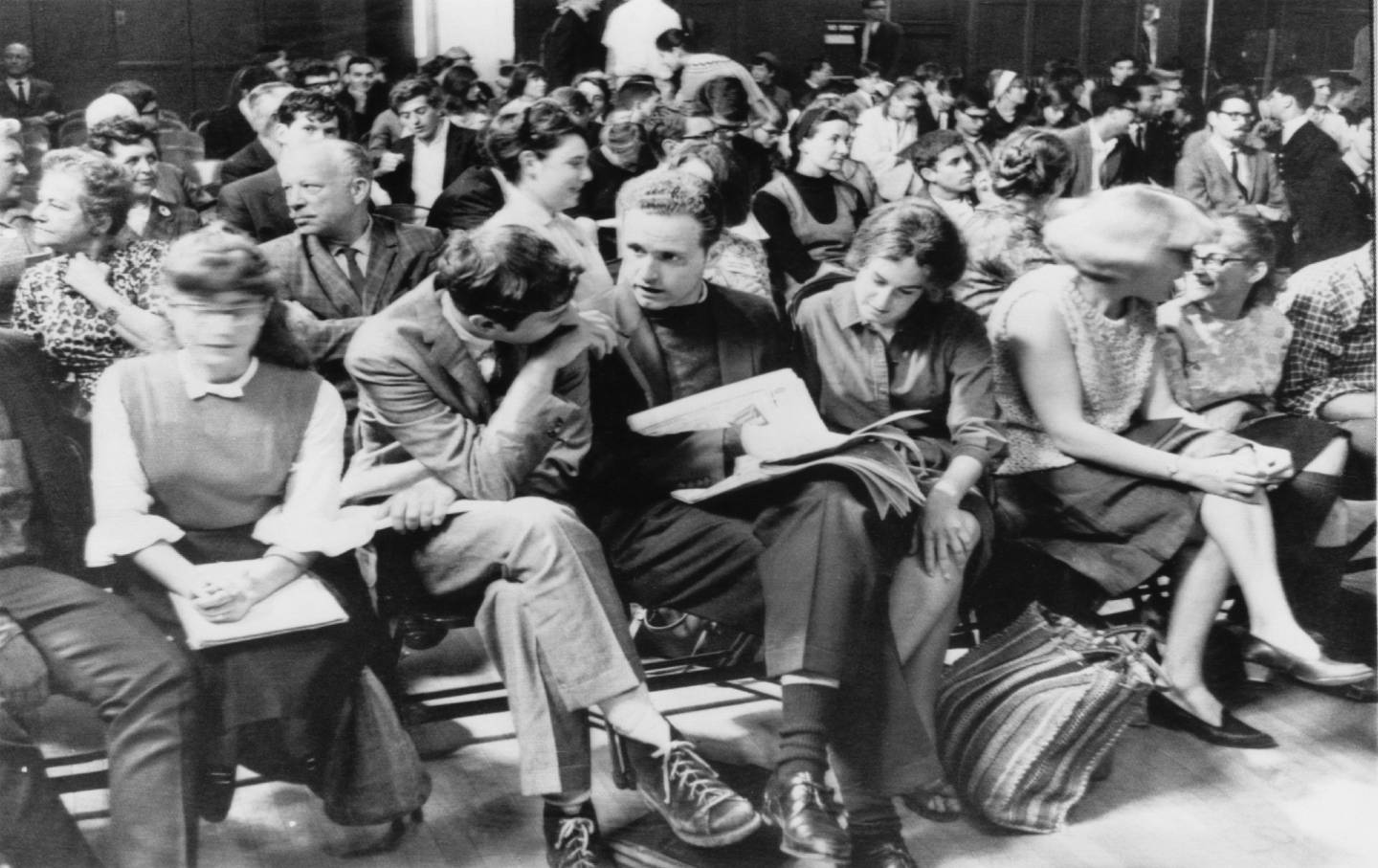After an Agreement to Divest From Israel, What’s Next for Trinity College Dublin?
The school’s Gaza Solidarity Encampment ended in just five days. But the path to divestment began before the encampment—and stretches far beyond.

People organize a pro-Palestinian protest outside Trinity College Dublin.
(Mostafa Darwish / Getty)
Almost every corner of the student union offices are full of supplies. László Molnárfi apologizes for the mess. Groceries are piled up in the kitchen. Signs and broken-down tents, pillows and folded-up blankets are scattered across the hallways. Molnárfi, then-president of the Trinity College Dublin Students’ Union (TCDSU)—or Aontas Mac Léinn Choláiste na Tríonóide in Irish—says the supplies would later be distributed to asylum seekers sleeping in tents outside of the International Protection Office and along the Grand Canal. Handwritten in black ink on the wall of Molnárfi’s office, right above a line of megaphones sitting single-file in front of his desk, reads “Victory to the students”. Below that, etched in a bold red marker and time-stamped to just two days prior on May 8: “TCD agrees to divest.”
As the new school term begins, Jenny Maguire, TCDSU’s new president, says the union is fundamentally changed by the Gaza Solidarity Encampment, and remains steadfast in its commitment to a free Palestine. A large banner used for the encampment hangs on the wall behind her desk, serving as a symbol of the student movement’s ongoing efforts. It reads: “You are now entering Free Trinity,” a nod to Free Derry, an Irish autonomous area self-declared in Derry, Northern Ireland during The Troubles in the early 1970s. “We have reminded the university and all universities within Ireland of the power of the students and the bite that we still possess and are not afraid to use—which makes our bark a lot louder,” Maguire said. “The entire structure of the union is doubling down this year to become an even stronger campaigning body.”
The Boycott, Divest, and Sanctions movement has had a presence on TCD’s campus for the past eight years. In 2022, TCD BDS’s organizing led to Trinity’s divestment of over $2.7 million of equity investments in weapons manufacturers, including over $788,000 invested in Lockheed Martin, nearly $958,000 in Raytheon Technologies, and over $185,000 in BAE Systems, all of which sell weapons and surveillance technology to Israel. However, the past eight years of BDS campaigning, Molnárfi said, has mostly been ignored by management. Mobilizing for Palestine through direct action, such as the encampment in the spring, gained traction after Molnárfi and the 2023-24 sabbatical officers instilled a bottom-up grassroots approach from the beginning of the school year. “Power comes from people,” he said. “It is through the ability to threaten the reputation and the financiers of the university that we can actually challenge the authorities into abandoning things like fee and rent increases or securing things like divestment from unethical ventures.”
Energized to escalate, the union and its BDS campaign organized temporary occupations and sit-ins for Palestine throughout the year. “Once Columbia University set up its encampment, we felt inspired to do the same,” Molnárfi said. “It really felt that there was a mass movement here.”
Culminating after almost a decade of past BDS campaigning and a year of increased mobilization, the students established an encampment in Fellows’ Square in front of the Book of Kells entrance on May 3, demanding that Trinity College Dublin sever all ties with Israel. On May 8, the college issued a divestment agreement, and the Trinity students’ movement became one of the first around the world to have its demands met. The deal included divestment from Israeli companies with activities in occupied Palestinian territory and on the UN blacklist, cutting ties with its one remaining Israeli supplier, Enspire Science, expansion of support for Palestinian students, and the establishment of a task force that will consider divestment from remaining investments in Israeli companies and review all academic ties, student exchange programs, and research collaborations —the latter of the three amounting to over $2.7 million in funding for ongoing research projects that involve Israeli universities and institutes, including Tel Aviv University, Technion–Israel Institute of Technology, Weizmann Institute of Science, KI Research Institute, and Ben-Gurion University.
The victory wasn’t always assured. Less than two weeks prior to the deal, the university put student representatives, including Molnárfi and Maguire, through discipline hearings and issued a fine of more than 214,000 euro to the TCDSU for alleged financial losses brought on by disruptions from protests throughout the year. But the fine didn’t deter the students from upcoming direct actions. They had found that polite, non-disruptive protests often go ignored.
Trinity’s fine against the union, later withdrawn, resulted in public outcry against the school, and—in conjunction with US schools’ violence against students—laid a favorable course for the union come May 3. “Now with the encampment started, the college knew that we had to win because, in turn, they would win,” Maguire said. “The United States colleges’ handling of encampments was so horrific and internationally condemned. In working and dismantling so quickly, and giving us what we wanted so quickly, we also gave them the opportunity to get out of this PR nightmare.”
Originally from Baltimore, Maryland, Quinn Katz-Zogby started at TCD in 2023 and immediately joined the BDS campaign. He said his call to organize draws on a long tradition of advocacy within his family—his father Jewish American, his mother Lebanese American, and his maternal grandfather running the Arab American Institute. “I never really chose to get involved in this sort of advocacy,” Katz-Zogby said, who is now the TCD BDS chair, “I grew up with it.”
Katz-Zogby was home in Baltimore during the encampment, which was around the same time as demonstrations at Johns Hopkins University, American University, and other schools in the D.C. area, many of which were met with brutality at the hands of the police. “Coming from an American context, I had to retool my brain to be like, ‘Well, realistically, the Garda are not going to come in and start smashing heads.’ We’re a global movement, but we have such different material conditions to America.”
The issue with the police in Ireland, Maguire said, is inconsistency, particularly in allowing, for example, the far-right to attack refugees and transgender people. “It’s negligence and it’s a lack of understanding the true threat that’s happening,” Maguire said. “What happens in [America] shows the power of the state and that the state is not out to support marginalized people. That is the same here, but it shows itself in different forms.”
The conditions in which Trinity agreed to divest are far different from that of American universities, particularly regarding the state-sanctioned violence inflicted upon students across the United States. Yet TCDSU’s achievements—small but crucial nonetheless—signal a broader shift in public consciousness, according to Molnárfi. “This is a worldwide movement, and a movement of which Trinity is only a small part,” Molnárfi said. “With our combined efforts, it can finally be the start of the loss of social legitimacy for what Israel has been doing to the Palestinians for more than 76 years. We see other deals being made between protesters and universities, and all of this shows which way the wind is blowing.”
The work is far from complete. Maguire said the relationship between the union and the university is currently a good faith, constructive one, but that is provisional. She said TCD fully divested from investments in occupied territories in June. Additionally, the task force on which Maguire will sit on is on schedule to be established during the first meeting of the Trinity Board on October 9. Although Molnárfi said the task force holds uncertain outcomes, it follows behind Trinity’s Colonial Legacies project, which began in 2021 and led to initiatives such as the denaming of the former Berkeley Library to the Library of Trinity College Dublin (its previous Anglo-Irish namesake, George Berkeley, was an enslaver and white supremacist, and also from whom the city of Berkeley, California—and its associated UC campus—gets its name).
“Everything is going according to plan, but the union is not naive,” Maguire said. If TCD fails to keep its word regarding full divestment, or if the task force appears ineffective, she said the union will take action. “Should we need to mobilize again, we will come back stronger, because we have to. We owe it to this,” she gestures to the handwritten victory declaration on the wall behind her. “We owe it to the Palestinian people.”








